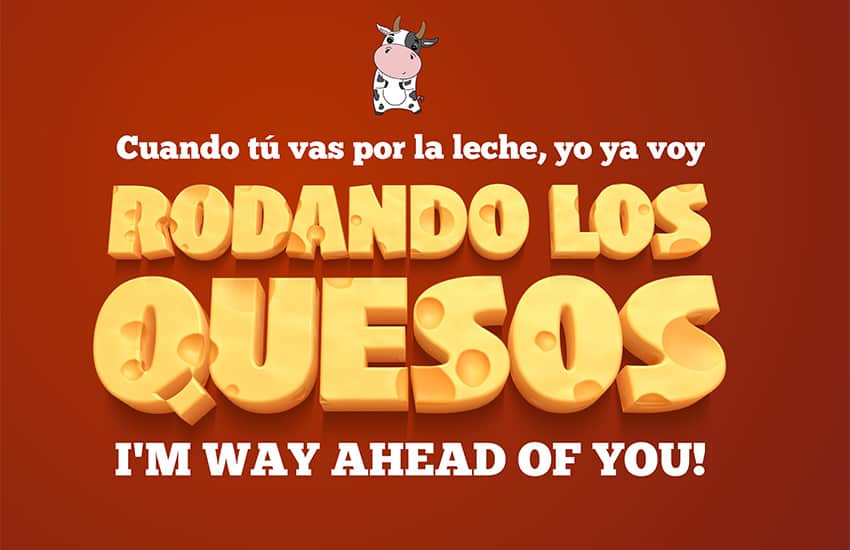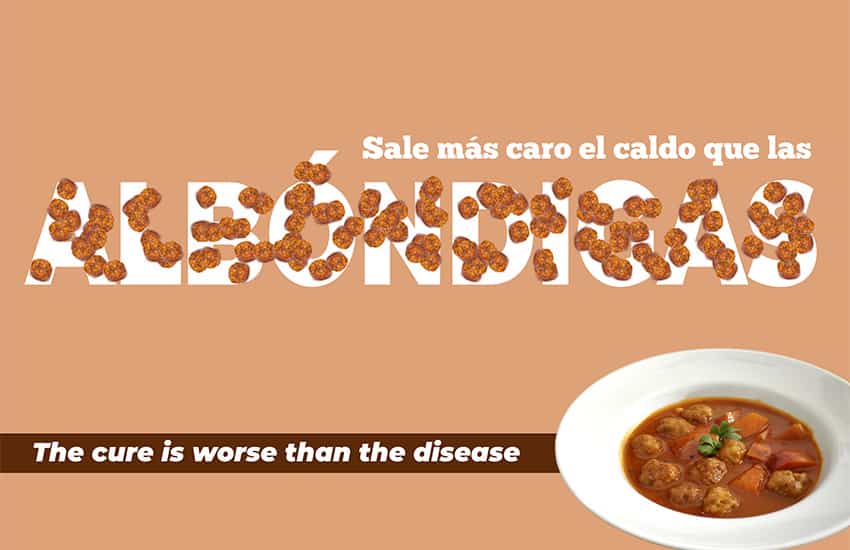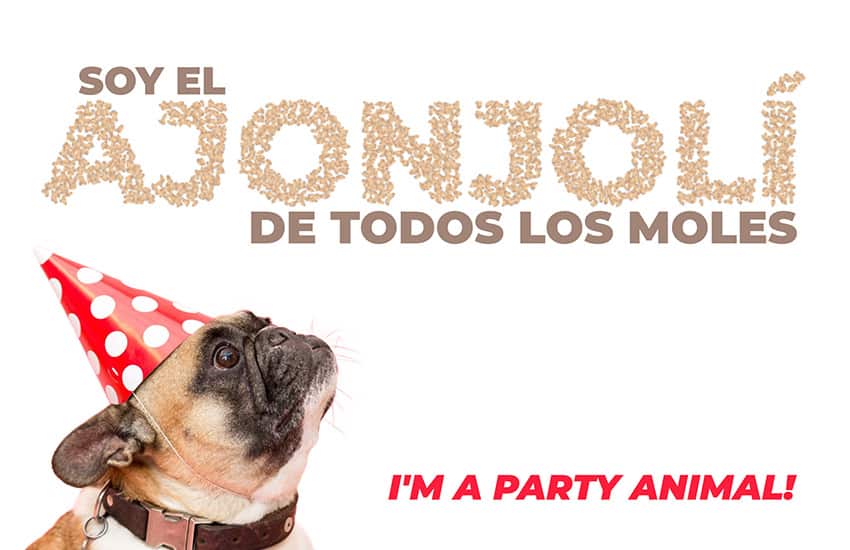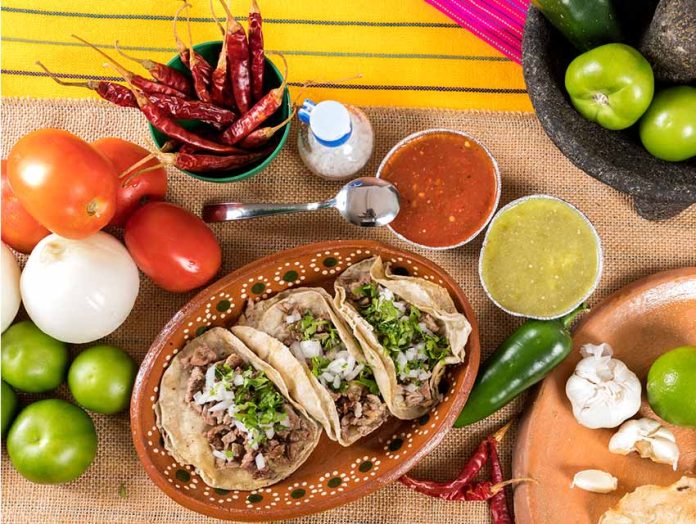Mexico’s mouthwatering cuisine has accomplished more than just delighting our palates and swelling our waistlines; it has immensely enriched local Spanish and expanded the colorful portfolio of Mexican sayings.
Come with us as we explore five common food-related expressions and discover the real meaning behind the metaphors.

In each case, we include the literal meaning, which may help you to visualize the underlying linguistic logic.
1. Cuando tú vas por la leche, yo ya voy rodando los quesos.
Literal meaning: When you go for the milk, I’m already rolling the cheeses.
Fancy crafting your own cheddar cheese? Hope you have oodles of time. Even mild cheddar can take two to three months to age. If you’re barely leaving to buy the milk, you haven’t even started yet.
Milk this saying for all it’s worth when your spouse or close friend suggests something you thought of long ago. It’s the equivalent of “I’m way ahead of you!”
Wife: ¿Ya pagaste la factura de la luz? (Did you pay the light bill?)
Husband: Cuando tú vas por la leche, yo ya voy rodando los quesos.
2. Echarle mucha crema a los tacos
Literal meaning: to put a lot of cream on the tacos
A little sour cream on those tacos adds a nice touch, but too much can ruin them. If your significant other has a tendency to spin tall tales, bring them back down to earth with this culinary adage.
Husband: Hoy saqué un pescado de 5 kilos. (Today I caught a 5-kilo fish)
Wife: Bájale, mi amor. Le estás echando mucha crema a los tacos. (Come on, dear, you’re exaggerating.)

3. Regar el tepache
Literal meaning: to spill the fermented pineapple drink
Are you a big talker? Eager to be the first to spread the news? If so, be careful not to spill the beans, or in this case, the tepache, a fermented drink made from pineapple or other fruits.
¡Híjole! ¡Ya regaste el tepache! Nadie más supo que mi esposa está embarazada.
Man! You spilled the beans! No one else knew my wife is pregnant.
4. No se puede chiflar y comer pinole.
Literal meaning: You can’t whistle and eat corn meal.
Multitaskers beware! There are certain activities that you can’t perform simultaneously, as this popular adage asserts. If you had pinole, a sweetened corn meal, in your mouth, it would be impossible to whistle.
Tab this corny logic when someone attempts the impossible or the inadvisable without visualizing the big picture.
Quieren acabar con el virus y abrir la economía al mismo tiempo. No se puede chiflar y comer pinole.
They want to eradicate the virus and open the economy at the same time. You can’t do two things at once.
5. Ser el ajonjolí de todos los moles
Literal meaning: to be the sesame seed of all mole sauces
Mexico’s mole sauce is internationally renowned. The bitterness of chocolate, the bite of peppers, the acidity of tomatoes, the pungency of garlic — together with any number of select ingredients — combine to make mole a gastronomic delight. But moles are like snowflakes: no two are alike.
Even so, sesame seeds are the common denominator; they’re in the majority of variations. Logically, if someone is considered the sesame seed of all sauces, they are staples of the social scene, they’re invited to every party — or they have done a little of everything. But be careful: it can also mean someone who’s at every party because they invited themselves, i.e., they’re nosy or meddlesome.
I once asked a woman her religious affiliation. Her answer will be forever burned into my memory:
Yo he sido católica, evangélica, y mormona; he sido el ajonjolí de todos los moles.
I was Catholic, Evangelical, and Mormon; I’ve been all over the place.

6. Del año del caldo
Literal meaning: from the soup year
In what year did your great-grandparents get married? Do you even know their names? If an event happened that long ago, then natives will say it happened in the year that soup was invented.
Deje de mirar esas fotos; son del año del caldo. (Stop looking at those pictures; they’re super old.)
7. Sale más caro el caldo que las albóndigas.
Literal meaning: The broth ends up being more expensive than the meatballs.
We live in a throwaway society. In developed countries, who gets their shoes repaired? Who pays to get a printer fixed? In many cases, the repair costs are prohibitive; it’s more feasible to buy a new item.
Order up this saying when faced with unreasonable repair costs or any other endeavor that in the long run won’t be worth the trouble.
Person A: ¿Qué te parece si llevamos el microondas a repararse? (How about getting the microwave fixed?)
Person B: No, ¿qué crees? Sale más caro el caldo que las albóndigas. (Are you kidding? The cure is worse than the disease.)
So, remember: you are what you eat. Be determined, then, to fully digest these culinary sayings. If you do, when they pop up in everyday conversation, you will find yourself as cool as a cucumber.
¡Buen provecho!
Lee Jamison has lived and worked in Latin America for more than 25 years and is a resident of Mexico. He operates the site insiderspanish.com and is the author of the book My Burning Tongue: Mexican Spanish available in paperback and Kindle formats at amazon.com. He has also written guides on the Spanish spoken in Costa Rica, Guatemala, Nicaragua, and Panama.
